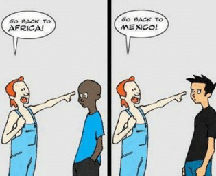“Aww, Ms. Tucker. I was just playing. It was a joke,” one of my students said. I then explained to the student that what he’d said to his Hispanic classmate about burritos was akin to people telling African Americans, like him and like me, to go back to Africa. I remembered how such comments had made me feel while I was growing up, as if people like me did not “belong” in America.
“Do you know where that classmate was born?” I asked. “You assume that because he speaks Spanish, he comes from a place where burritos are a common food. That’s stereotyping.”
This conversation took place last year, during my first year teaching middle school physical education (PE), but I was in no way surprised by this dialogue. Earlier, when I’d taught elementary PE, I’d noticed a debate between two second-graders during my lunch duty. “What’s going on?” I asked. One of the students, who was African-American, said, “Ms. Tucker, he’s saying he has a White grandmother.” I said, “Okay.” He went on, “Yeah, but he’s Black. He can’t have a White grandmother if he’s Black.” My response was, “Actually, he can.”
While I would have loved to go into a discussion about race being a social construct created to divide people and that we are actually more alike than we are different, my second-graders were content with my confirmation that it was actually possible for a Black student to have a White grandmother. They went back to their lunches, and I heard no further discussion.
So, How Do These Conversations
Relate To PE?
These examples demonstrate the need for more lessons on social awareness. To me, social awareness is just as important as teaching my students how to become lifelong movers. As much I love to teach students about fitness and movement, I also recognize the need to teach them how to understand and respond to the needs of others from diverse backgrounds.
I help my students exercise their social awareness by building a community. When I taught at the elementary and secondary level, I engaged students in activities with the intent to help them get to know their classmates, determine their commonalities, and establish a classroom focused on mutual respect. I took activities that we’d already done and revamped them.
For example, I handed out Fitness Bingo sheets during our fitness unit. In previous years, students would travel around the room with their sheet and complete exercises in the bingo box with different partners. But the revamped bingo sheets also had question prompts. As students traveled around, they had to find someone who could respond to the prompt and allow that person to write their name in the bingo box before completing the box’s exercise with that person.
Prompts included, “Find someone who speaks a different language. Do 10 jumping jacks with that person.” Or, “Find someone who was born in a different country. Find out what country and do 10 squats with that person.” Once the activity was complete, students discovered that they had learned something new about their classmates.
But the revamped bingo sheets also had question prompts. As students traveled around, they had to find someone who could respond to the prompt and allow that person to write their name in the bingo box before completing the box’s exercise with that person.
I also created an activity called “Build a Gym,” a revamped version of capture the flag. Each team has their own poster that reads “Build a Gym” with empty Velcro stickers on it. Just like in capture the flag, students are placed on two teams, and there’s a line of cones in the middle of the playing area separating them.
However, instead of capturing a flag, the goal is for students to capture as many positive cards as they can to fit on their team’s poster before being tagged. The positive cards contain all of the attributes that we want in our PE class, including respect, many languages, beliefs, patience, and different cultures. But the taggers in “Build a Gym” are students holding noodles with unkind words on them like bullying, gossiping, impatience, and disrespect.
After playing a couple rounds of the activity, I ask the students, “What do we want in our PE class that helps us to build a community?” And then, “How does bullying, gossip, and disrespect prevent us from building that community?” Unfortunately, our world has become a place where hatred of others is all too common. But my goals with “Fitness Bingo” and “Build a Gym” are to help facilitate mutual understanding between students and create an inclusive community where all are accepted.
I am hoping to create a learning environment where students are able to correct a peer who says something hateful. And, I am just the teacher who cheers from the sideline while that student confidently takes a stand.
Note: Tucker is a contributor to Port Of Harlem. However, this article first appeared in Physical Education Quarterly Magazine, December 2018.







